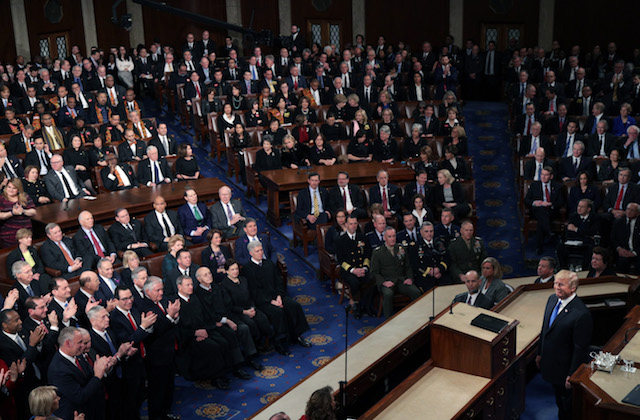President Trump on Tuesday (January 30) urged Congress to find a "compromise" on immigration reform—one that balances a pathway to citizenship for young immigrants with strengthened border security—in his first State of the Union address.
The president made his first public appeal to lawmakers to accept an immigration plan—"one where nobody gets everything they want"—that the White House released last week.
"The first pillar of our framework generously offers a path to citizenship for 1.8 million illegal immigrants who were brought here by their parents at a young age," said Trump, referring to young immigrants commonly known as "Dreamers."
The proposal would offer citizenship to Dreamers after a 10- to 12-year period if they meet certain education and work requirements. In exchange, Congress would agree to provide $25 billion to fund "a great wall" on the U.S. southern border. The framework would also slash legal immigration by ending the visa lottery program and downsizing family-based migration, which allows U.S. citizens and residents to sponsor relatives for lawful residency. Trump’s own family has benefited from this program, according to reports.
Trump began the immigration segment of his speech by attempting to link immigration to violence. He took direct aim at MS-13 (and likely boosted their recruiting efforts), the El Salvador-based gang with a strong presence in immigrant communities in Los Angeles and Washington D.C.
"For decades, open borders have allowed drugs to and gangs to pour into our most vulnerable communities," said Trump, as two Long Island families whose daughters were killed by MS-13 watched the speech inside the Capitol. "Most tragically, they have caused the loss of many innocent lives."
Trump failed to note that study after study, from a diverse group of experts, have shown that undocumented immigrants are much less likely to commit crimes than U.S. citizens.
Trump launched his immigration overhaul one year ago, crystallizing the anti-immigrant rhetoric that he had employed throughout his presidential campaign. Within days after his inauguration, he signed executive orders that banned immigrants from seven Muslim-majority countries, sought to recruit more Border Patrol agents, and targeted so-called sanctuary cities that attempt to limit cooperation with federal immigration officials. The directives have rattled immigrant communities.
In September Trump rescinded Deferred Action for Childhood Arrivals (DACA), the Obama-era programs that shielded some 700,000 dreamers who were brought to the U.S. as children, and called on Congress to find a legislative solution. Lawmakers have agreed to address the fate of dreamers, and avert another government shutdown, before February 8.
The Trump administration followed the DACA directive by announcing in November that it would end Temporary Protected Status (TPS) for some 59,000 Haitians who fled their country after a 2010 earthquake. They were given 18 months to leave the country of face deportation. Early this month, the administration ended TPS for roughly 200,000 Salvadorans. They have until September 2019 to leave the country or find an alternative legal status.
On Tuesday night, Democrats and immigrant rights groups swiftly condemned Trump’s State of the Union address. Congressman Joe Kennedy of Massachusetts, tasked with the official Democratic response to the speech, appealed to immigrants in Spanish.
"And to all the Dreamers watching tonight, let me be clear: Ustedes son parte de nuestra historia. Vamos a luchar por ustedes y no nos vamos [a] alejar. You are a part of our story. We will fight for you. We will not walk away," he said.
Other Democrats boycotted the address altogether, while those in attendance booed Trump when he used the term "chain migration," which has become a pejorative for family-sponsored immigration, and blasted the president for associating immigration with violence.
"The tone was of a divider-in-chief," Sen. Richard Blumenthal (D-Conn.) said, according to Politico. "It was a red-meat appeal to the anti-immigrant base of his party, not the unifying, coming-together appeal that we all know is necessary."
Other critics cast more explicit judgment on the speech.
"Donald Trump is selling out America," Rashad Robinson, executive director of the social justice group Color of Change, said in a statement. "He is a racist oligarch beholden to his white nationalist base and billionaire friends. Behaving like an adult for one speech doesn’t change those facts. After more than a year of toxic policies and attacks on marginalized communities, the time for hoping Trump might change is long over."
